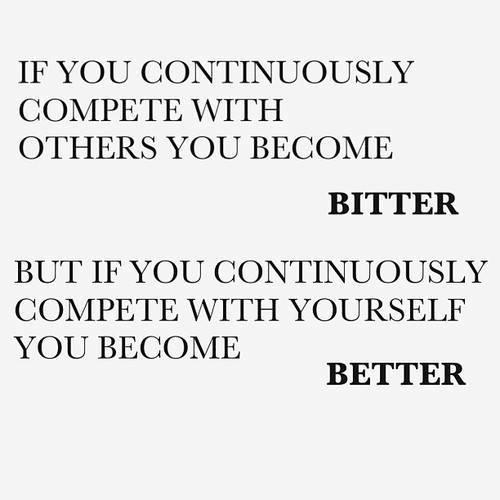2 Types of Competitors
There are two types of competition in this world: internal and external. The internal type pushes you to best yourself. The external type pushes you to best your competition.
There are pros and cons to each route and there are people who naturally gravitate towards one or the other. In my experience, extroverts tend to be externally competitive while introverts tend to be internally competitive. This is logical because, by definition, each group is effortlessly focusing on their competition every day.
I played football with guys who were obsessed with the upcoming game. They’d spend hours watching film, researching individuals on the internet, and game-planning for one week of competition. Come game time, these external competitors knew who they were facing better than the opposing team knew themselves.
On the other hand, internal competitors would focus on their processes. They would work on technique, they would practice fundamentals, and they would push to innovate their own schemes. Adjustments during the game were easy because they knew where they could improve and this gave them a big advantage.
Neither was mutually exclusive, but there were obviously sides of the fence that we picked.

Just to be clear, I am not endorsing this point of view. I don’t believe this is 100% accurate, keep reading.
Bitter Versus Better
There goes your competitive side, always comparing one to the other. What none of these motivational sayings (there’s a million of them) takes into account is that internal and external competition are not at odds with each other. Neither camp is right or wrong.
Both camps are positive if harnessed correctly. Some of the America’s greatest business men like Cornelius Vanderbilt and John D. Rockefeller competed with each other to create their empires and help build the competitive marketplace on which our economy was founded. Then there are cases such as Philippe Petit who tight-roped between the twin towers. He made amazing things happen without being driven by some external force, he just had an internal fire.
Think of competition more of a life cycle rather than a line in the sand. Sometimes we need to focus on ourselves and other times we need to focus on external forces. In sticking with the football analogy, it’s silly to think about your upcoming game while you’re doing footwork drills, you need to concentrate on being the best you can be in that moment. Conversely, when you’re down by seven in the fourth quarter and it’s time to make a comeback, you need to focus every ounce of your energy into beating your competition, even if it’s just by one point.

Learning to Compete With Others
When you were a kid, did you have a poster of yourself on your wall? Nope. Well, I hope not at least… You probably had a poster of Michael Jordan or Mia Hamm or some other sports icon above your bed. You wanted to be just like them – the early stages of competition.
I don’t ever recall saying something like, “I’m going to grow up to be the best version of myself!” We probably said something more like, “I want to hit homeruns like Ken Griffey Jr. when I grow up!” The focus was external.
In business, the idea is similar. I work with a design agency and many new companies come to us with ideas for apps. Their pitches typically contain a version of this phrase:
“We’re kinda like [insert massive, random tech company], but with a twist.”
– Every Person With An App Idea, Ever
They don’t even know how to define their business, yet. They have been so focused on what they could be that they’re introducing themselves as a replica of some one else. Makes sense, those other companies inspired their idea. Before we can learn to compete with ourselves, we have to compare ourselves to others, even if it’s not a direct or even fair comparison. This tells us how far we have to go, lets us set our sights at a place above our current situation.
Often times, what we aspire to be is so far off, we can’t imagine what it would look like. It’s much easier to relay the message of who we want to be or who we could be in the form of a comparison to others. External competition isn’t a bad thing, but it takes some evolution to be at the top of your game.
Learning to Compete With Yourself (is much harder)
Competing with yourself is difficult. There is literally no end result, only continual iteration. It requires discipline to stay focused and keep driving. The hardest thing is never letting yourself off the hook for a mediocre job, even with an external victory.
Think about the sports team that crushes it’s opponent by a landslide. The team is happy but the coach is ticked. They played down to their competition’s level. Since they didn’t get better during the match, the coach makes his team condition after their victory. The coach is sending a reminder that they are competing to be the best they can be, not competing with the team on the opposite sideline. This sort of self-awareness and discipline is rare, but the best have it ingrained in their DNA.
If you look at the top people in industry and sport, two of the most competitive places I can think of, you’ll see the top performers oscillate between internal and external competition. You have to know how to compete with others before you can compete with yourself.
First, you set your sights on someone else and how to beat them. Next, you compete and compete and compete and eventually you beat the opponent you’ve been obsessed with. Then, you’re stuck with a “now what?” feeling in your gut. Finally, you figure out how to compete with yourself and stay hungry by setting your sights higher and focusing on your processes. It’s not always possible for your competition to push you. It is, however, possible for you to always be better than your best self.
This idea came from the book Tribal Leadership: Leveraging Natural Groups to Build a Thriving Organization as Dave Logan and his team discuss the top performing companies in the world and what sets them apart. One of the biggest differences between Level 4 companies and Level 5 (tops on their scale) companies is their ability to compete with themselves instead of others. They explain how competition with others is like training wheels as they learn to compete with themselves.
I agree wholeheartedly with the ideas in the book, to learn to compete with yourself you have to compete with others. However, the best in the world still know how to win a fight when needed. Think about Apple and it’s never-ending battle with Microsoft. Or Peyton Manning and his relentless study of his opponents. The best in the world know how to push themselves, but it never hurts to have some competition.
—
Leave me a comment or chat with me on Twitter, I’d love to hear from you. Have a great weekend!


